The use of herbs and spices in our chickens’ diet has attributed to a beautiful, healthy looking flock and nutrient dense eggs our friends and family LOVE. We are constantly getting comments that our fresh eggs are “the best” and the only thing we can attribute to this is our dedication to providing the best for our flock’s diet. There are five specific herbs and spices we use for healthy chickens: garlic, turmeric, cinnamon, oregano, and cayenne pepper.

Our family loves our backyard chickens. They provide us great family entertainment, delicious and nutritious eggs aplenty, build our confidence as new homesteaders, and help us create a more low-waste kitchen by eating our scraps! Because our chickens give us so much, we in turn as chicken keepers want to provide a variety of herbs and spices that naturally benefit their general health.
During winter, we may not spend a lot of time outside enjoying our chickens, but we do spend a lot of time prepping their snacks! Actually, we spend a lot of time year-round cleaning out the chicken coop, refreshing the chicken feed with medicinal herbs and spices and ensuring there’s no mold, and offering them plenty of free-range time and access to specific herbs and spices that boost our chickens’ immune systems. I do tend to prioritize additional attention and care to their needs in the winter as they have less organic access to free range as they please and what their bodies need.
Keeping chickens is truly a low-effort homesteading task compared to other animals. That does not mean, however, that we can ignore their needs and neglect them! We take a “farmer” approach to things in that we believe that our animals are ours for a purpose. We need to treat them with respect and be good stewards over them, but they are ultimately for a specific purpose and are not equated to “pets.” If they are no longer useful, they no longer have a place on our homestead. I know that is controversial to some, but that is the approach we take on City Folk Homestead with all animals we bring onto our property. Therefore, we are very motivated to take care of them the best that we can, because we are serving one another.
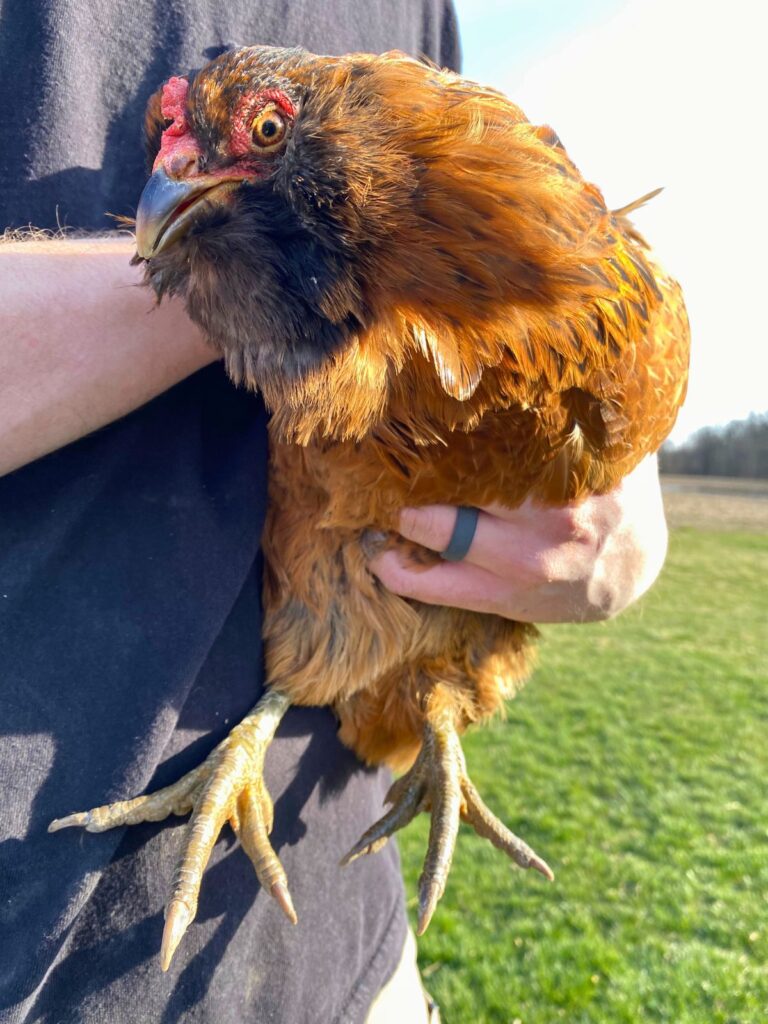
The simple way of feeding herbs and spices to your chickens
We feel called to draw back to our roots and be as natural as possible in keeping our chickens. The best way we have found in chicken keeping to maintain a healthy flock and consistent egg production is to recognize the health benefits of culinary herbs and prioritize them in our chickens’ daily feed. There are many good reasons for caring for our flock through understanding the benefits of herbs and spices and how we can boost healthy immune system functions through a natural antibiotic.
While our layer feed provides the protein our hens need to lay consistently, the beta carotenes found in free ranging and by offering fresh or dried herbs and spices to our flock ensures robustly orange egg yolks and healthy chickens even when they are stuck in the chicken run. As of yet, we have not had any chicken disease or illness spread throughout the flock. We believe these herbs and spices are a great way to naturally prevent these illnesses and also increase respiratory health, blood circulation in the winter months, and offer antibacterial properties that ward off other health concerns.
How do we feed our chickens these specific herbs and spices?
The easiest ways we have found to offer our chickens these nutritional benefits is by sprinkling the fresh herbs (or dried herbs if you don’t have your own herb garden or if you have dehydrated them for winter use) directly onto the kitchen scraps that we offer our chickens daily. Generally whatever is good enough for us to eat, we find sufficient for our chickens–though they do have their preferences!
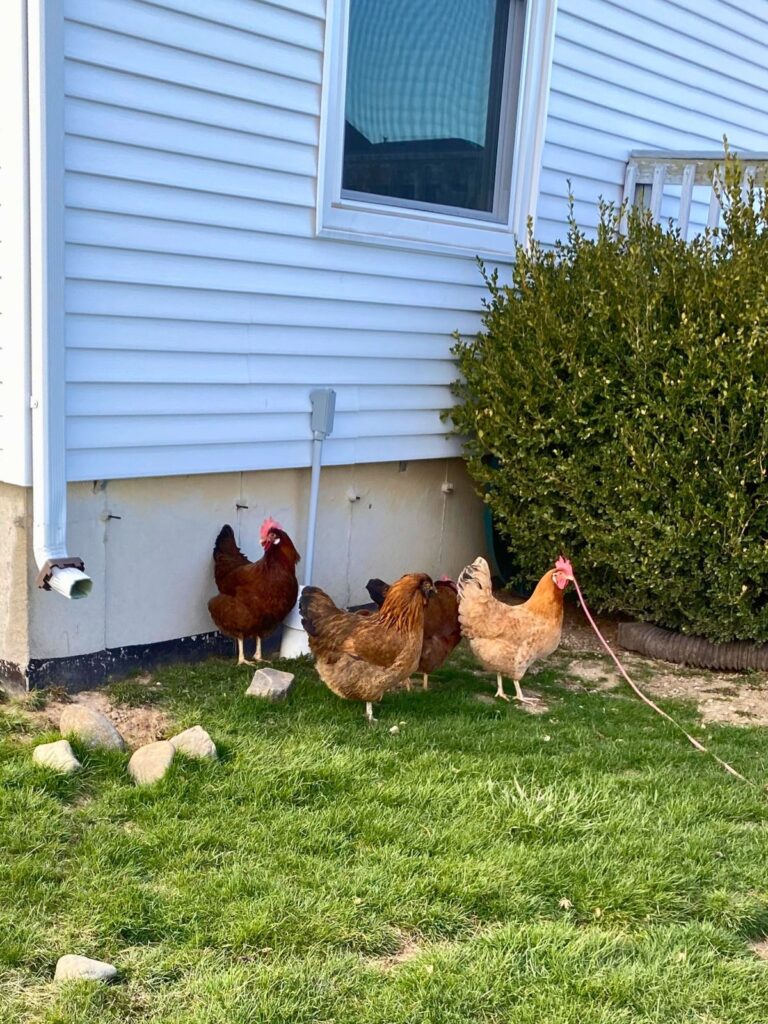
Some of our flock’s favorite snacks are oatmeal, leftover scrambled eggs or meat, spinach and other leafy greens, and pumpkin that I freeze in the fall and thaw. We collect all of these in a chicken treat bowl that sits on our kitchen counter. The scraps are then offered to the flock daily after being topped with a mixture of the herbs and spices detailed below.
For more on what kinds of kitchen scraps we feed our chickens, check out my post “Chickens are omnivores: What feathered pigs eat” (coming soon!). I call chickens feathered pigs because they truly do eat just about everything we leave on our plates!
Another option for these herbs and spices is to sprinkle on and combine with your chicken feed. I have also heard of laying fresh herbs in the nesting boxes of the chicken coop. Perhaps your chickens will peck at the fresh leaves and eat a sample while in the nest boxes. I have not tried this myself, however. I have found adding to their food is sufficient for our needs. We enjoy scraping our plates off after each meal and providing a little extra to our chickens throughout the day. Even the kids will get in on the fun and save a little extra from their meal “for the chickens.” They are learning to be very thoughtful!
Specific herbs & spices we prioritize in our chickens’ diet
The top five fresh herbs and spices we recommend for chicken health are garlic, turmeric, cinnamon, oregano, and cayenne pepper or crushed red pepper. We like to top almost everything off with a mixture of these on a regular basis as preventative herbal remedies for common chicken diseases. This mixture is a nutritional powerhouse and offers a variety of health benefits.
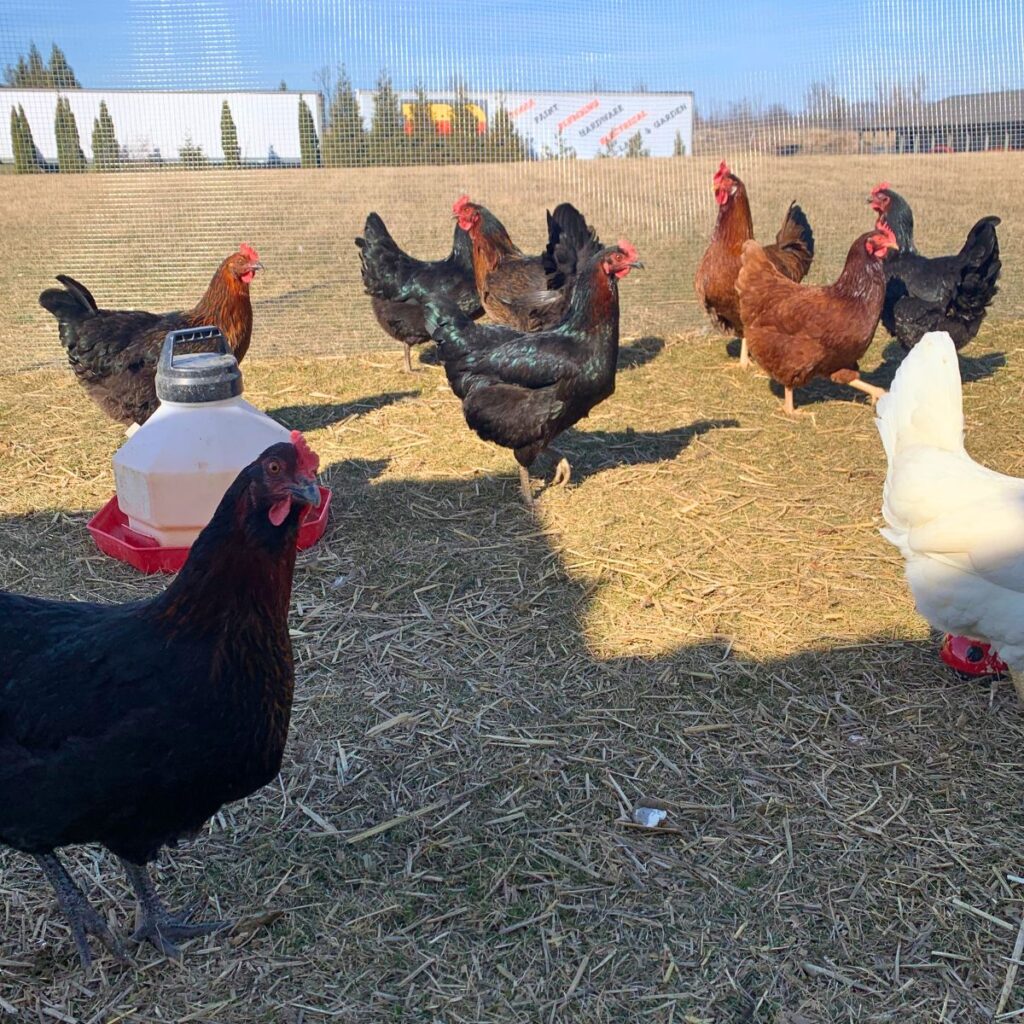
This list of the best herbs and spices I have found benefitting our backyard chickens’ health is not comprehensive. If you are wanting to boost your chickens’ respiratory systems and immunity to common chicken diseases and illnesses, then this is an easy way to do so.
Health benefits of culinary herbs and spices for your backyard chickens
Garlic and oregano to naturally strengthen chickens’ immune systems
Garlic is packed with health benefits for humans and poultry alike. According to Cackle Hatchery’s “Garlic for Chickens” post, it is considered more of an antiseptic than an antibiotic because garlic kills on contact. Homesteaders interested in herbal remedies know that it is important to have a wide variety of tools in your arsenal when dealing with natural health. It is also good to know what properties each herb/plant has in order to use it effectively.
As for the use of garlic for chicken health, it is used to boost immunity by either adding to water or sprinkling on food. We have found sprinkling on food in either powder or minced form works best for us. I purchase garlic in bulk and mince it myself for our kitchen use and chicken food. The easiest way to batch make this is to mince garlic cloves and freeze them in pucks that can be thawed. I add a puck or two on top of the scraps and let it thaw before taking out to the chickens. If instead you desire to add garlic to your chickens’ waterer, Cackle Hatchery suggests crushing four garlic cloves into a gallon of water.
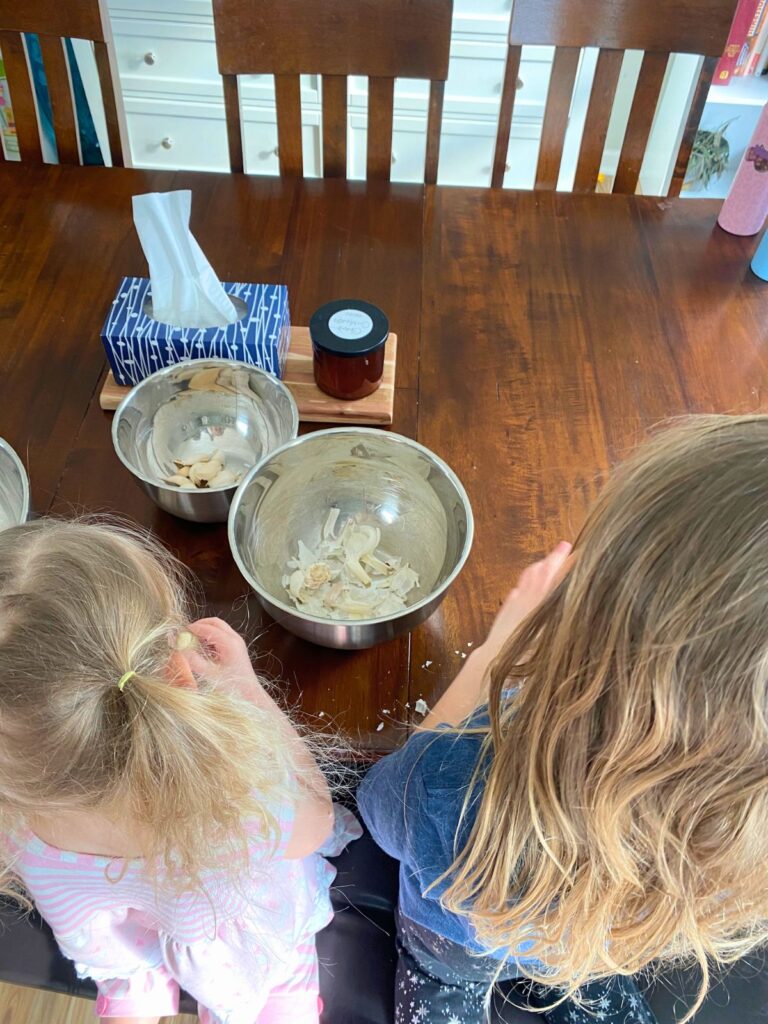
Oregano is a perennial herb and spice that is specifically used for its antibacterial and immune-enhancing properties (PoultryDVM “Oregano for Chickens“). It provides some protection against a common chicken illness coccidiosis and helps fight off E.coli and Salmonella.
Turmeric and its anti-inflammatory properties
Turmeric is a beneficial additive for a chicken’s diet whether they are a layer or a broiler. For meat chickens, turmeric can improve weight gain and feed conversion rate. It has also been found to increase meat quality.
For layer chickens, there are also numerous benefits. The curcumin in turmeric is integral for anti-inflammatory and antioxidant effects. It increases shell thickness, egg quality, and egg production, as well as decreases harmful gut bacteria. There is also convincing research on how turmeric improves overall disease resistance in laying chickens.
I purchase turmeric in large quantities at our local farm store and sprinkle on their scraps or mix in with their feed. Be warned: it will leave a yellow dusting and can cause discoloring. We use stainless steel bowls for this purpose as they are easiest to clean.
Cinnamon for healthy digestion
Cinnamon is nutrient-packed! First Light Farmer’s post “Can Chickens Eat Cinnamon?” details all of the nutrients this spice contains: Phosphorus, vitamin K, potassium, magnesium, calcium, and more! Why is this helpful to chickens? Cinnamon’s nutrient makeup can protect against respiratory infections, aid in digestion, improve egg production, and is a mild blood thinner. This is great for increasing blood circulation, which is especially important in the winter months where the wattle, comb, and feet are at risk for frostbite.
I also want to highlight the benefits of gut health in chickens (particularly in the winter). Chickens need grit to digest their food effectively. Most chickens that are in a coop and run setup will need to be provided grit that is purchased at a store. However, free range chickens typically forage for their own grit and do not necessarily need additional supply.
Our chickens are free range except during the winter months when we can’t get the door open due to the snow. Therefore, we do not provide them any additional grit and have had zero issues with this, as there is plenty of space for them to find their own. However, this is not possible in the winter months! So we add cinnamon frequently, if not daily, in order to encourage that digestive health even when their access to free ranging and naturally-occurring grit is hindered.
Cayenne pepper: a laying stimulant for winter
As part of our natural chicken keeping philosophy, we do not use heat lamps or lights in our chicken coop during the cold months at City Folk Homestead. Instead, we allow nature to take its course and believe chickens were designed for a natural break from egg-laying similar to the earth and plants needing a break from producing by going dormant in the winter. We do not want to disrupt this natural cycle, but we do want to encourage our chickens to be warm from the inside out when temperatures drop below zero and the wind gusts are up to 60mph. Therefore, we add cayenne pepper or crushed red pepper to their daily scraps to warm up their bellies from the inside out during the dark and frigid winter months.
If you are one who doesn’t stand against spiciness well, no worries for your backyard chickens. They can’t taste the heat of the pepper, but once it reaches their insides it will provide an additional warmth. One of our favorite ways to spoil our chickens in the winter is to warm up some oats that have been fermenting all day and add some cayenne pepper on top for them to enjoy before the long night in the chicken coop.
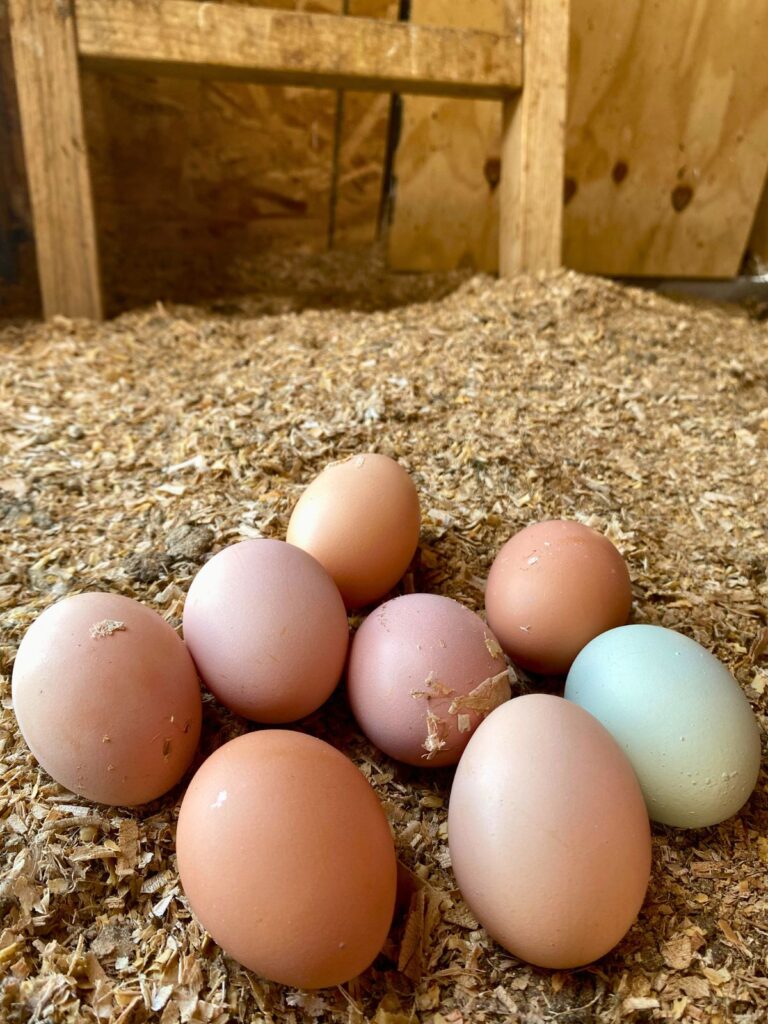
As a side effect to the choice of offering cayenne pepper or red pepper flakes to our flock, we have noticed that they do still have stimulated egg production. It is not the same production as with a heat lamp, though it is something. Without water glassing our eggs we would still have to purchase a couple of dozen from the store in the dead of winter. But it is also still exciting to thaw out the water and find an egg or two in the coop in January. If you follow City Folk Homestead on Facebook or Instagram, though, you know the problem we face then is whether or not they are frozen by the time I find them!
If you need more reasons to add cayenne pepper to your chickens’ diet, check out Lisa Steele’s post. Hello, beautiful, healthy chickens and eggs!
Bonus tip for the healthiest backyard flock around
Another beneficial additive to your chickens’ diet is apple cider vinegar. I make my own apple scrap vinegar to add to their waterers, but any organic ACV with the mother is a great option. A splash of apple cider or apple scrap vinegar added to your chickens’ water is one of the best ways to maintain a healthy chicken as it benefits several major body functions such as respiration, digestion, and the immune system according to Organicfeeds.com.

Creating a garden with fresh herbs for chicken health
Great news for homesteaders: most of the fresh herbs mentioned in this post can be grown in a chicken herb garden that will benefit your chickens and your kitchen!
Oregano is considered a perennial herb that can be grown in USDA zones 5-11. Better yet, it is even categorized as “low maintenance!” I’m sure many homesteaders are already familiar with oregano, its benefits, and plant care as oregano oil is extremely beneficial to human health as well. It is also a natural insect repellant, which comes in handy with owning backyard chickens. When oregano is planted by garlic, it is also protected from the insects it is vulnerable to. This is a win-win! Garlic can be grown in two general varieties: Hardneck and softneck. Hardneck varieties are cold hardy and grow well in zones 1-6. Softneck garlic can be grown in zones with warmer temperatures year-round, specifically zones 7-10.
As for turmeric, it is not cold hardy and therefore only grows well in zones 8-11. If you do live in these zones, it is a perennial and can be used fresh as it is similar to ginger for multiple uses in the kitchen. Cinnamon comes from the inside bark of a tree that is only grown in USDA zones 10-12. It is rather common for purchase in most stores, however, if you are unable to grow your own tree. Lastly, cayenne peppers and red chili peppers are also only hardy in zones 9-11 and the plants are generally treated as annuals.
Though some are very zone specific for growing, all of these herbs and spices are commonly found in store or online. While it is every (at least most) homesteader’s dream to be completely self-sufficient, it is still a step in the right direction to naturally look for ways to boost health in our animals and ourselves! So don’t be discouraged if you can’t grow every one of these plants in your own chicken garden. Know you are still doing the right thing by simplifying the ways in which our bodies (chicken and human) receive the nutrients we need for healthy immune and respiratory systems. You got this, natural chicken keeper!

haha! you’re right- chickens are feathered pigs! I love it! I am so glad that nothing goes to waste. I totally forgot about feeding them herbs too! I usually have an abundance .